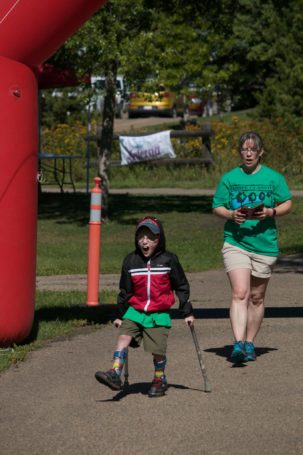October 22, 2020
Those living with Spina Bifida and Hydrocephalus persevere through the pandemic with a strong support system
Many were hit hard by the pandemic, but for the Spina Bifida and Hydrocephalus Association of Alberta (SBHANA), things just seemed to be a bit more dire.
“Symptoms of shunt malfunction mimic some of the same symptoms of COVID 19,” said Kim McDonald, program coordinator of the SBHANA. ”Taxis wouldn’t take them because of the nausea, and family members could not take them, so they would have to resort to taking an ambulance at a high cost to themselves.”

On June 11, Edmonton Community Foundation donated $20,000 to the SBHANA as part of the Government of Canada’s $350-million Emergency Community Support Fund (ECSF) to help charities and non-profit organizations adapt and increase frontline services to vulnerable people during COVID-19.
“One of the key principles of the ECSF is supporting communities and individuals who have been particularly hard-hit by COVID-19 and its effects,” Craig Stumpf-Allen, ECF’s Director of Grants and Community Engagement says. “Our committee recognized that increased isolation and strain for caregivers was a distinct challenge.”
“For those that have Spina Bifida and Hydrocephalus, one of their main doctors is a neurosurgeon,” McDonald added. “For hydrocephalus, you need a shunt that is used to drain the cerebrospinal fluid from the brain to the stomach and at times things may go wrong with the shunt, such as blockage or infection.”

There are also visitations to pediatric neurosurgeons, and during the pandemic, this led to decreased access for adult patients as the neurosurgeons could only focus on younger patients, so adults had to go to the emergency department to seek help. This ECSF donation hopes to alleviate some of the anxiety and pressure that those living with the afflictions feel.
There are also supplies including masks, gloves, hydrogen peroxide, rubbing alcohol etc, which are all in high demand, leaving those that have wounds without the needed supplies.
McDonald also pointed out that when the government mandated that all health care aides from long- term care work only at one location, this caused serious issues for those families that have and need health care aides to come into their home to supply support. “Many families were left with no support and having to care for their loved ones around the clock,” she says.
The Canadian Red Cross, Community Foundations of Canada and United Way Centraide Canada are all collaborating with the Government of Canada to flow ECSF support to those who need it most right now.
“The funding provided support for many of the SBHANA members, and was able to assist them with their mental health and alleviate some of the worries that this pandemic has caused,” McDonald said.
Learn more about the Emergency Community Support Fund.